Sintra-Portugal.com
The best independent guide to Sintra
Sintra-Portugal.com
The best independent guide to Sintra
Parque da Pena - the gardens and park of the Pena Palace - an independent tourism guide for 2026
The Parque da Pena are the 200 hectares of lush forest and dramatic scenery that surrounds the beautiful Palácio da Pena.
Superficially, Pena Park could be regarded as a dense and wild woodland, but it is actually a purposely-designed landscape that sits harmoniously within its surroundings and complements the Romantic architecture style of the palace.
Found within the park are secluded footpaths through the forest, magnificent viewpoints from the top of craggy outcrops, flourishing fern gardens, cooling streams - and even a mock-alpine chalet.
Most visitors' experience of the Parque da Pena is the 15-minute walk uphill from the ticket office entrance to the palace. However, if you choose to explore the gardens and forest an enjoyable three hours could be easily spent in them. This article will provide a guide to the Parque da Pena, helping you to get the most from your visit here.
Highlights of the Parque da Pena
Alto do Chá (tea hill) – The third-highest peak of the Serra de Sintra provides the finest view of the Palácio da Pena. This boulder-strewn hill is far from the palace and offers a peaceful and calm atmosphere seldom found elsewhere in the park.
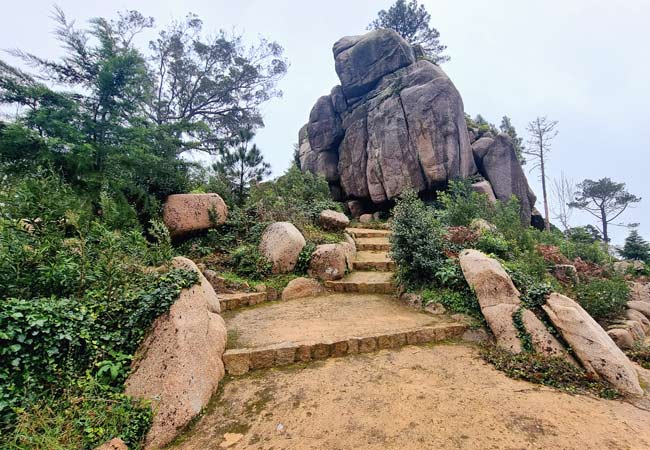
The Feteira da Condessa – A lush fern garden set in a deep valley that is surrounded by dense forest. The tiny streams, ponds and shaded paths make this the ideal place to visit after the hot and claustrophobic palace.
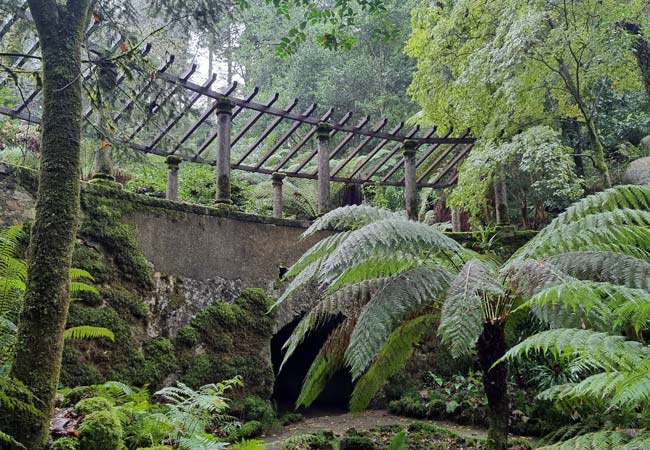
Chalet da Condessa d'Edla – delightful mock-alpine chalet designed by Countess Edla in 1869, which has an exterior decorated with local cork. Behind the chalet is a footpath that circles 'Pedras do Chalet' hill and passes beneath some massive boulders.
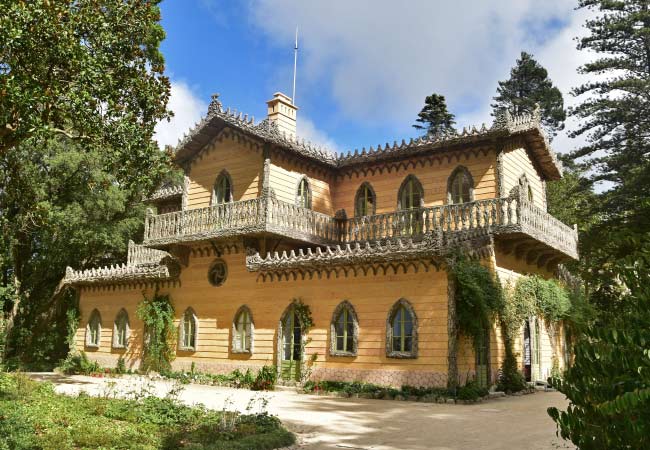
There are many more sights within the Parque da Pena, and these are detailed later in this guide.
Visitor information for the Parque da Pena
The Parque da Pena surrounds the Palácio da Pena and can be visited separately from the palace. A ticket purely for the grounds costs €10, which is ideal if you have visited the palace previously.
If this is your first trip to the Palácio da Pena complex, you will want to visit the actual place building and its colourful terraces first. The Parque da Pena is only a side attraction, either when waiting to enter the palace or afterwards.
Insight: The Palácio da Pena can only be visited via a timed ticket, which gives you a 30-minute window to enter the palace. These tickets should be purchased in advance of your visit (at least the day before) to secure the best time slot to enter. Pre-booked tickets can be purchased from GetYourGuide for €20, click here, which is the same price as when purchased from the ticket office.
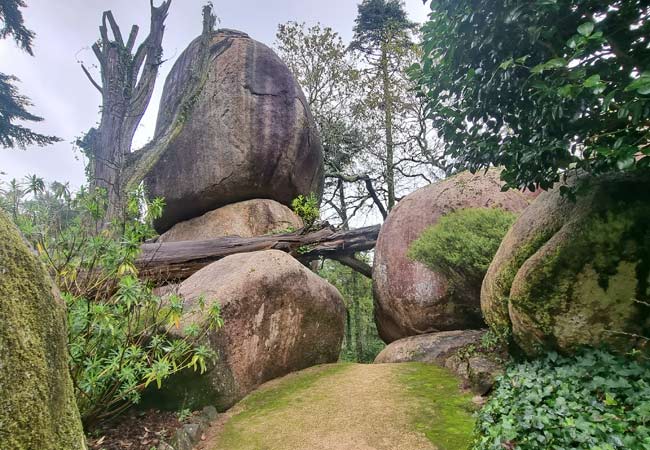
The Pedras do Chalet rocks, close to the Edla’ Callet
The Parque da Pena does not have time restrictions and is often explored when waiting for your allocated time slot to enter the palace. This can be 2 to 3 hours after booking your tickets from the ticket office, so always book your time slots for the Pena Palace the day before your visit.
Surprisingly very little of the Pena Palace can be seen from the Parque da Pena, as the palace sits on top of a rocky outcrop and is much higher than the surrounding forests. If you want to see the palace and its ornamental terraces, then you will need a timeslot ticket.
Insight: Many years ago, the Parque da Pena ticket used to allow entrance to the terraces, but it no longer does.
If you are visiting the Pena Palace as a day trip, we recommend visiting the palace and terraces first, before exploring the Parque da Pena with the remainder of your time (and energy). If you have a longer holiday in Sintra, you could spend a whole day in the park.
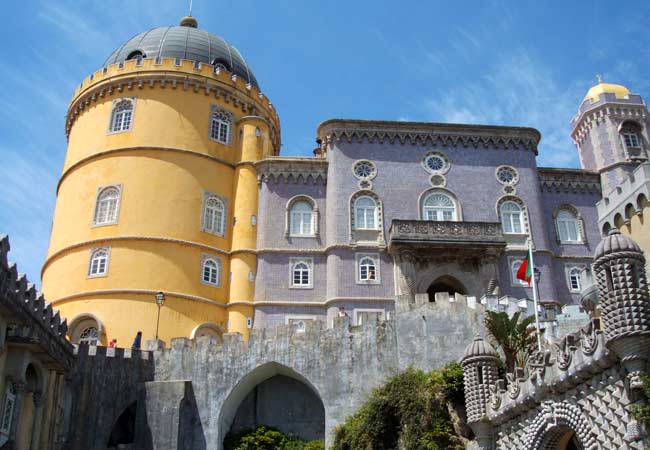
You will want to visit the terraces and interior of the Palácio da Pena
Suggested tours of the Parque da Pena
The Parque da Pena is a large and sprawling area, which feels so much bigger due to the many steep hills and labyrinth of paths.
All of the sights of Pena Park are to the south and west - this is confusingly to the top and right of the tourist maps provided on entry (the link to the PDF map is here).
There are two common routes that circle clockwise around the park and exit via the quieter Lake Entrance (Entrada Dos Lagos).
The shorter, 1-hour route stays close to the palace and visits the Jardim Das Camélias (Camellia Garden), Gruta Do Monge (Grotto of the Monk), Feiteira Da Rainha (Queen's Fern Valley) and the Vale dos Lagos (Valley of the Lakes)
The longer, 2.5-hour route loops around the southern and western edges of the park. This route includes the Templo Das Colunas (Temple of the Columns), the Estátua do Guerreiro (Warrior Statue), Cruz Alta viewpoint, Alto Do Chá viewpoint, the Chalet Da Condessa D'edla, the Pedras do Chalet (Chalet Rocks), the Feteira Da Condessa (The Countess' Fernery), the Cavalariças (Stables), the Jardim Inglês (English Garden) and the Vale dos Lagos (Valley of the Lakes).
Another popular option is walking to the Cruz Alto viewpoint via the Warrior Statue. The Cruz Alto is the highest point of the park, but the view of the palace is blocked by the tree line.
The map below shows the location of all of the sights in the Parque da Pena. The green route marks the 2.5-hour route, and the yellow line shows the shorter suggested tour. The red line is the 10 minute walk from the ticket office to the main entrance of the Pena Palace. (Note: Zoom out to see all of the points)
Key: 1) Palácio da Pena 2) Ticket office and entrance 3) Templo Das Colunas 4) Estátua do Guerreiro 5) Cruz Alta 6) View point 7) Lago de Cascais 8) Alto Do Chá viewpoint 9) Chalet Da Condessa D'edla 10) Pedras do Chalet 11) Feteira Da Condessa 12) Stables 13) Jardim Inglês (forest) 14) Vale dos Lagos 15) Jardim Das Camélias 16) Feiteira Da Rainha 17) Gruta Do Monge 18) Quinta Da Pena 19) Alto de Santa Catarina viewpoint 20) Entrada Dos Lagos
The official map of the park can be downloaded from the ParquesdeSintra website here
Sights of the Parque da Pena
The Estátua do Guerreiro (Warrior Statue)
Standing atop a towering rock formation (the Tapada do Ferreira) is the Estátua do Guerreiro, a 2.75m-high granite statue of a medieval warrior holding an iron spear. When the statue was first installed in 1848, it stood high above the tree line, but today is half hidden by the dense forest.
Insight: There is no path up to the statue, and there is no way to scramble up the rocks.
At the base of the hill is a stone table, which was Queen Amelia's favourite location in the park.
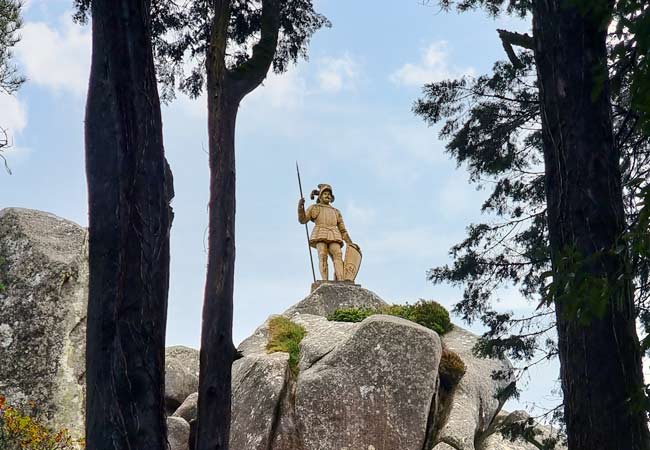
Cruz Alta
The Cruz Alta is the highest point of the Serra de Sintra region at 529m, and one of the most popular points in the park. Sadly, it may be the highest point, but the view to the Pena Palace is partially blocked by trees. There are wonderful views southwards to Cascais, but not of what everyone hopes for.
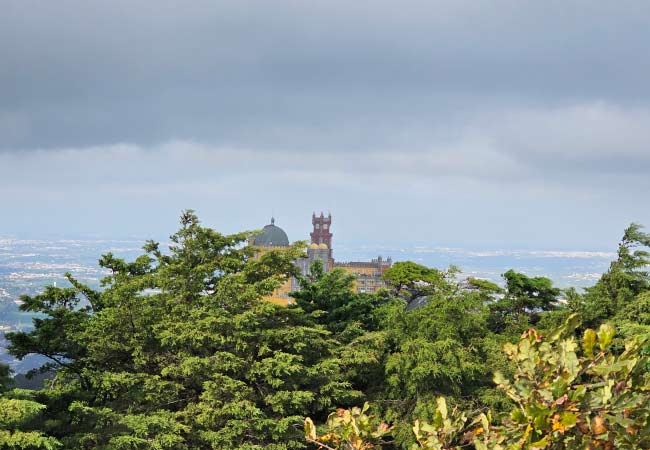
The obstructed view of the Palácio da Pena from the Cruz Alta, from a camera lifted as high as possible, it’s such a shame the tree tops aren’t cut slightly
Insight: The best view of the Pena Palace is from the Alto do Chá. There is a secondary viewpoint on the rocky outcrop 400m to the west of Cruz Alta which is not blocked by the trees.
At the top of the rocky mount at Cruz Alta is a cross that was installed during the 16th century, ordered by King João III. The walk to Cruz Alta from the Pena Palace takes 20 minutes and follows a peaceful, shaded route through the forests.
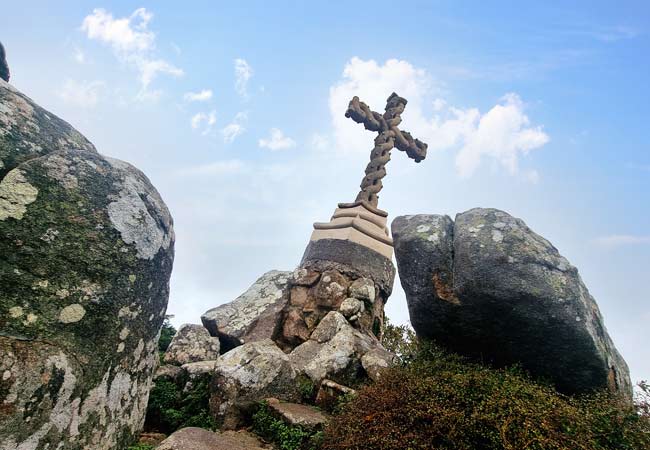
The cross at the top of Cruz Alta
Alto do Chá
The Alto do Chá hill is situated on the southwestern side of the Parque da Pena and is a real hidden gem of the region.
This side of the park is exposed to strong winds and winter storms, leaving it less densely vegetated and closer in appearance to how the region would have looked to King Fernando during the late 19th century. This side of the park is seldom visited by tourists, yet it provides the finest view of the Palácio da Pena, along with magnificent views southwards over the Cascais coastline.
The hill and surrounding area are known as Tea Hill, as in 1883 it was the first location in Portugal where attempts were made to grow Camellia Sinensis (tea plants). It was believed that the unique climate of Sintra (wet, warm and almost tropical) closely resembled that of the tea-growing regions of Asia.
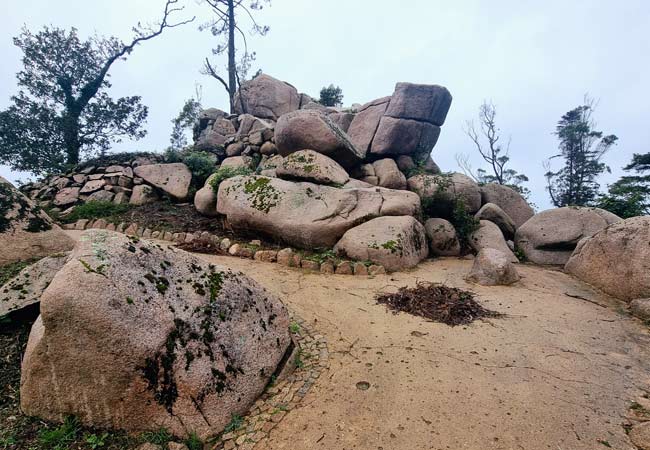
The rocky summit of Alto do Chá
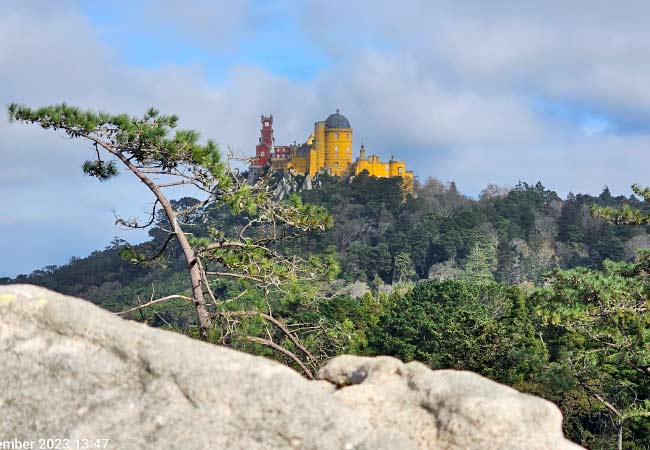
The view of the Palácio da Pena as seen from the top of Alto do Chá
Pedras do Chalet
For most visitors, the Pedras do Chalet (Chalet Rocks) is one of the best attractions of the Parque da Pena, but it is rarely mentioned in any tourist literature.
The hill is formed from massive rocks, where the constant winter rains have eroded any soil or loose material. All that remains are colossal boulders, with the path to the top winding between them and even beneath them. Some of the precariously balanced boulders are so huge that it can feel more like a cave than a path. Along the path are a number of decent viewpoints.
Insight: If you come to the Parque da Pena for social media photos or with children, you will want to include the Pedras do Chalet.
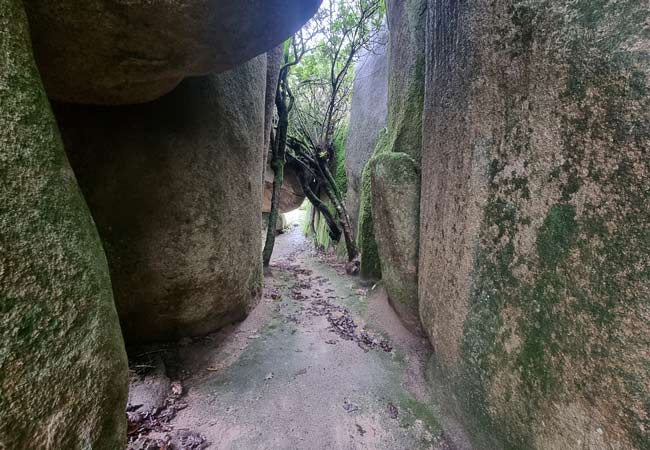
The path between the giant boulders
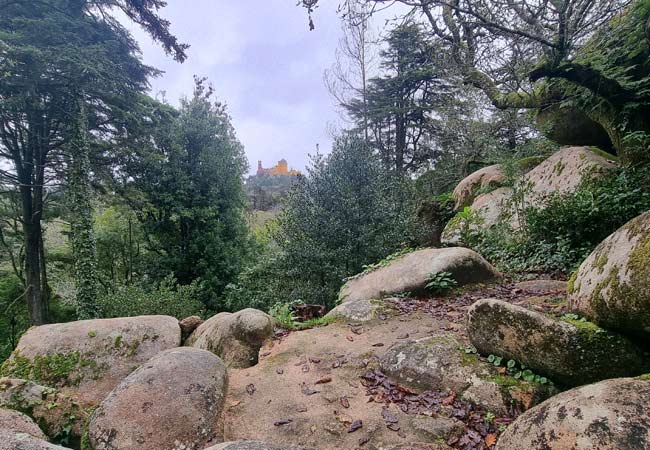
Vale dos Lagos
In the deep and sheltered valley to the west of the palace is the Vale dos Lagos (Valley of the Lakes), which offers a cooling and refreshing end to a tour of the Parque da Pena. Originally a stream flowed through the valley, but it was later dammed, creating five lakes.
The most notable features are the two extravagant duck houses, one in the centre of the lake (resembling the Moorish castle) and a second that has many similarities to the Pena Palace.
Insight: Close to the Vale dos Lagos is the 'Entrada Dos Lagos' (Lake Entrance). This exit from the Pena Palace is served by the 434 bus, which means you don't have to walk uphill back to the main entrance.
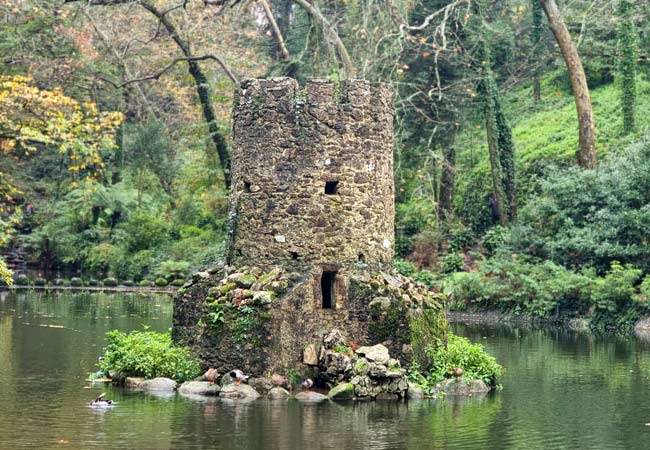
Our most popular guides to Sintra
Expert Insight: These guides are curated by Philip Giddings, a travel writer with over 26 years of local experience in Portugal. Since 2008, Phil has focused on providing verified, on-the-ground advice for the Sintra region, supported by deep cultural ties through his Portuguese family. Read the full story here.
If you've found our content valuable, we'd welcome your support.
The digital publishing landscape has evolved significantly. As a small independent publisher, we face growing challenges. Search engines increasingly favour paid content over organic results, while AI-generated content often reproduces original work without attribution.
To support our work, please consider bookmarking this page (press Ctrl + D) for quick access. If you find an article helpful, we'd be grateful if you'd share it with friends on social media.
For specific questions, please see our Reddit community at r/LisbonPortugalTravel.
Should you notice any outdated or incorrect information, please contact us at [email protected]
Thank you for helping us continue to provide valuable content in an increasingly challenging digital environment.




























